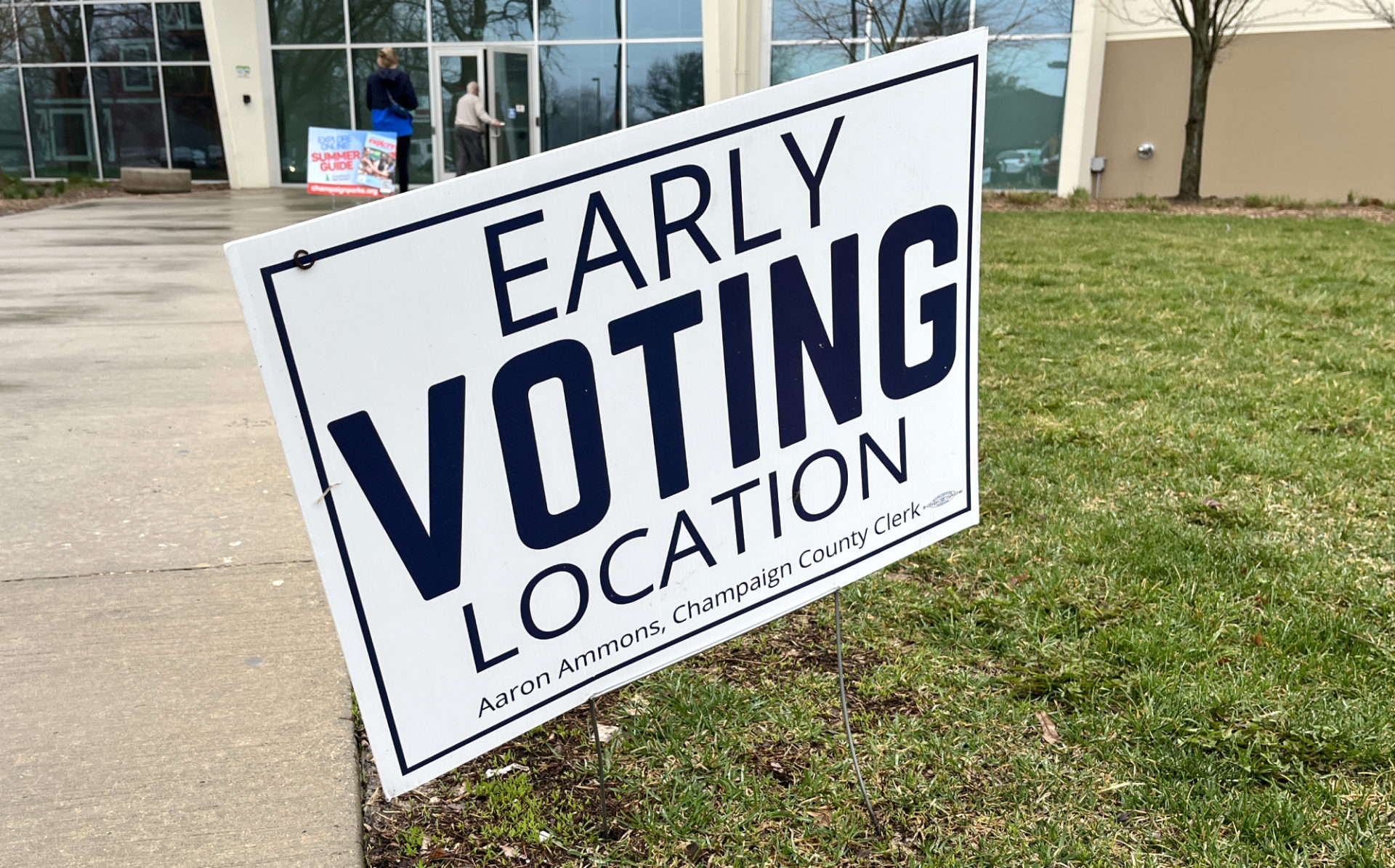The official 2023 consolidated election results are in. Most of the high-profile races were in Champaign. We took a look at the results and made some observations.
More people voted in this general election than in the last one, but not by much. Alongside the more promising news that more people were registered to vote (136,443), only 14.1% of eligible voters cast ballots. This is less than a one percentage point increase from the 2019 consolidated election (13.4%). As we noted in our plea to remind you to vote, such low turnouts means that some races are decided by only a handful of votes.
Mail-in voting with the option to drop your ballot at designated locations has been an excellent way for those who cannot vote in person to have their votes counted. Sure, it means a less dramatic election night, since ballots postmarked by election day have up to two weeks to arrive. Even though we might miss some of the excitement of knowing who has won on election night, we will gladly accept a calmer evening in exchange for all of our neighbors’ votes getting counted.
There weren’t that many Urbana races on the ballot, but the entire Urbana 116 school board was up for reelection. Each sub-district race was uncontested. What’s going on in Urbana? Why aren’t more people willing to serve on the school board? We’ve talked briefly about some of District 116’s problems of late, but we will be keeping our eye on things as they progress.
In Champaign, the mayor, at-large city council seats, and Unit 4 school board seats were on the ballot. Looking at the results, this felt like a status quo election; we imagine very little will change within those offices.
Mayor Deb Fenien was easily reelected to a third term, with a commanding 74.35% of the votes. Though City of Champaign elected officials are technically non-partisan, we know this is not actually the case. Feinen is a longtime Republican elected official, but since the Trump years has pivoted to more moderate and Democratic-leaning positions, making her a more attractive candidate to progressive voters. This year she was endorsed by the Champaign County Young Democrats, who, frankly, seem to have more bad feelings toward former mayor and defeated candidate Don Gerard than anything else.
Serving with Mayor Feinen on the City Council will be incumbents Matthew Gladney and Will Kyles, who beat out former councilperson Greg Stock by fewer than 100 votes. There wasn’t much difference between the vote tallies of the city council candidates. Gladney was the top vote-getter with 5,297 votes and Greg Stock had the fewest at 4,391— that’s a difference of just 906 votes across four candidates. All of the candidates have experience in local governance, so there wasn’t any opportunity for a wild shake up with “nontraditional” candidates. Kathy Shannon, who previously served on the Unit 4 School Board, will join the two incumbents. With only one new voice on the City Council, it’s unlikely that much will change in the actual governance and priorities of the city.
The Unit 4 school board had four seats were the ballot. Voters elected Betsy Holder (18.26%), incumbent and current board president Amy Armstrong (17.51%), previous board member Jamar Brown (17.04%), and Mark Thies (13.18%). Brown served on the school board from 2011 to 2015, so he is experienced. Holder is interested in addressing early childhood and elementary programs as well as the needs of marginalized students through better opportunities. Thies did not respond to our interview request, but in other interviews he alluded to focusing on respectability in the classroom and ensuring age-appropriate books for children, but not banning them. We will be watching to see how this new crop of board members handles the challenges that face Unit 4 over the next four years, and what changes, especially to the elementary schools, may be proposed.
These local elections often lack the substance and flare of state and federal elections. That much seems inevitable: they are not (technically) partisan positions and most candidates are not funded by huge donors. You don’t see massive billboards or even all that many yard signs. These are mostly just regular people who are your neighbors, wanting to serve their community. We can’t let the lack of pizazz deter us from paying attention and casting our votes.
As we noted in our previous election editorial, what feels like a lack of substance is often because there are almost no opportunities for debates, and candidates can get away with vague statements in questionnaires and interviews. These can be boring and hard to follow for the average voter, who may be left wondering if their vote matters (it does) and if it matters who is elected (it does). To be clear, we are not advocating for sensationalist candidates doing song and dance numbers to gain votes. Voters need to pay attention, of course, but as a community we can ask for more opportunities to drill down into what these candidates actually believe, and what their plans are if elected. Are they familiar with the goings-on of the school board or city council on which they want to serve? A more engaged electorate means candidates will have to offer platforms that reflect their knowledge, temperament, and suitability for these positions.
At risk of nagging, we strongly encourage you to vote in these local elections. Fighting through election burnout is real, but these local positions are consequential.
The Editorial Board is Jessica Hammie, Julie McClure, Patrick Singer, and Mara Thacker.








